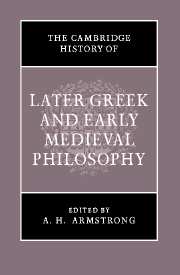Book contents
- Frontmatter
- Chapter 1 Introductory
- Part 1 GREEK PHILOSOPHY FROM PLATO TO PLOTINUS
- Chapter 2 The Old Academy
- Chapter 3 Aristotle
- Chapter 4 The Later Academy and Platonism
- Chapter 5 The Pythagoreans
- Chapter 6 The Peripatos
- Chapter 7 The Stoa
- Part II PHILO AND THE BEGINNINGS OF CHRISTIAN THOUGHT
- Part III PLOTINUS
- Part IV THE LATER NEOPLATONISTS
- Part V MARIUS VICTORINUS AND AUGUSTINE
- Part VI THE GREEK CHRISTIAN PLATONIST TRADITION FROM THE CAPPADOCIANS TO MAXIMUS AND ERIUGENA
- Part VII WESTERN CHRISTIAN THOUGHT FROM BOETHIUS TO ANSELM
- Part VIII EARLY ISLAMIC PHILOSOPHY
- Select Bibliography
- Additional Notes and Bibliography
- Index of ancient and medieval works referred to in the text
- General Index
- Index of Greek terms
- References
Chapter 2 - The Old Academy
from Part 1 - GREEK PHILOSOPHY FROM PLATO TO PLOTINUS
Published online by Cambridge University Press: 28 March 2008
- Frontmatter
- Chapter 1 Introductory
- Part 1 GREEK PHILOSOPHY FROM PLATO TO PLOTINUS
- Chapter 2 The Old Academy
- Chapter 3 Aristotle
- Chapter 4 The Later Academy and Platonism
- Chapter 5 The Pythagoreans
- Chapter 6 The Peripatos
- Chapter 7 The Stoa
- Part II PHILO AND THE BEGINNINGS OF CHRISTIAN THOUGHT
- Part III PLOTINUS
- Part IV THE LATER NEOPLATONISTS
- Part V MARIUS VICTORINUS AND AUGUSTINE
- Part VI THE GREEK CHRISTIAN PLATONIST TRADITION FROM THE CAPPADOCIANS TO MAXIMUS AND ERIUGENA
- Part VII WESTERN CHRISTIAN THOUGHT FROM BOETHIUS TO ANSELM
- Part VIII EARLY ISLAMIC PHILOSOPHY
- Select Bibliography
- Additional Notes and Bibliography
- Index of ancient and medieval works referred to in the text
- General Index
- Index of Greek terms
- References
Summary
Introduction
Neoplatonism is a term usually designating Plato's philosophy as reinterpreted by Plotinus and post-Plotinian Platonists. The term is slightly misleading, in that to some it may suggest a more radical difference between the philosophies of Plato and Plotinus than is warranted, in that it tends to obscure the debt of Plotinus to Platonists before him, particularly the Old Academy and the Platonism of the period between the first century B.C. and his time (today often designated as pre-Neoplatonism or Middle Platonism), and finally in that it suggests that all post-Plotinian Platonism bears the stamp of Plotinus' philosophy, whereas in many cases his influence on other Platonists was only limited.
However, in what follows we shall, in the main, limit ourselves to indicating those Platonic and post-Platonic philosophic doctrines which were probably of major importance for Plotinus, and the knowledge of which helps us to place his philosophy in historic perspective. No attempt will be made to ascertain the primary sources of these doctrines or to reconstruct systems of which only fragments have survived, nor do we plan to compete with an apparatus fontium. We shall simply present those major philosophic doctrines which we, in explicit form, still possess and which Plotinus knew, or in all likelihood knew. The framework of our presentation is provided by four passages in Porphyry's Vita Plotini. In the first, Porphyry says that Plotinus' writings contain Stoic and Peripatetic doctrines, and that all of Aristotle's Metaphysics is present there in condensed form.
- Type
- Chapter
- Information
- Publisher: Cambridge University PressPrint publication year: 1967



